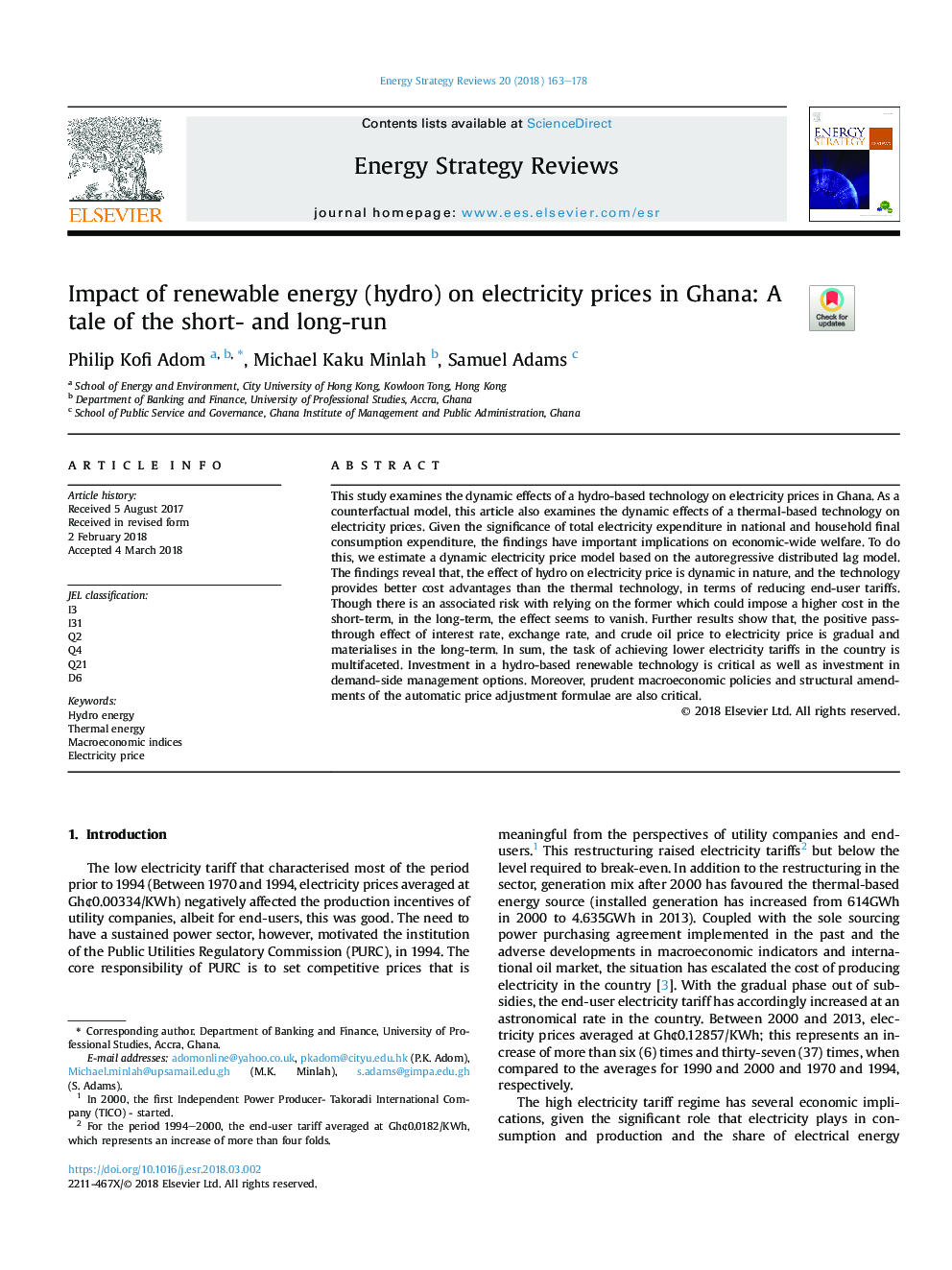| کد مقاله | کد نشریه | سال انتشار | مقاله انگلیسی | نسخه تمام متن |
|---|---|---|---|---|
| 7434553 | 1483520 | 2018 | 16 صفحه PDF | دانلود رایگان |
عنوان انگلیسی مقاله ISI
Impact of renewable energy (hydro) on electricity prices in Ghana: A tale of the short- and long-run
ترجمه فارسی عنوان
تأثیر انرژی تجدیدپذیر (هیدرولیک) بر قیمت برق در غنا: داستان کوتاه و بلند مدت
دانلود مقاله + سفارش ترجمه
دانلود مقاله ISI انگلیسی
رایگان برای ایرانیان
کلمات کلیدی
ترجمه چکیده
این مطالعه به بررسی اثرات پویای یک تکنولوژی مبتنی بر آب در قیمت برق در غنا می پردازد. در این مقاله، به عنوان یک مدل مخالف، این مقاله همچنین بررسی اثرات پویا یک فن آوری حرارتی بر قیمت برق است. با توجه به اهمیت کل هزینه برق در هزینه های مصرف نهایی مصرف ملی و خانوار، یافته ها پیامدهای مهمی در رفاه اقتصادی کشور دارند. برای انجام این کار، ما یک مدل قیمت پویایی قیمت برق را بر اساس مدل لاگرانژ توزیع شده خود برآورد می کنیم. یافته های این تحقیق نشان می دهد که تأثیر هیدروژن بر قیمت برق در طبیعت پویا است و تکنولوژی مزایای هزینه های بهتر را نسبت به تکنولوژی حرارتی از نظر کاهش تعرفه های کاربر نهایی فراهم می کند. با وجود اینکه در بلندمدت، با توجه به سابق که می تواند هزینه های بالاتری را در کوتاه مدت تحمیل کند، به نظر می رسد که این اثر از بین می رود. نتایج بیشتر نشان می دهد که اثر گذار مثبت نرخ بهره، نرخ ارز و قیمت نفت خام به قیمت برق به تدریج و در بلندمدت تحقق می یابد. به طور خلاصه، وظیفه رسیدن به تعرفه های برق پایین تر در کشور، چندجانبه است. سرمایه گذاری در فن آوری تجدید پذیر مبتنی بر هیدرولیکی مهم و همچنین سرمایه گذاری در گزینه های مدیریت تقاضا است. علاوه بر این، سیاست های اقتصاد کلان محتاطانه و اصلاحات ساختاری از فرمول های تنظیم خودکار قیمت نیز بسیار مهم هستند.
موضوعات مرتبط
مهندسی و علوم پایه
مهندسی انرژی
انرژی (عمومی)
چکیده انگلیسی
This study examines the dynamic effects of a hydro-based technology on electricity prices in Ghana. As a counterfactual model, this article also examines the dynamic effects of a thermal-based technology on electricity prices. Given the significance of total electricity expenditure in national and household final consumption expenditure, the findings have important implications on economic-wide welfare. To do this, we estimate a dynamic electricity price model based on the autoregressive distributed lag model. The findings reveal that, the effect of hydro on electricity price is dynamic in nature, and the technology provides better cost advantages than the thermal technology, in terms of reducing end-user tariffs. Though there is an associated risk with relying on the former which could impose a higher cost in the short-term, in the long-term, the effect seems to vanish. Further results show that, the positive pass-through effect of interest rate, exchange rate, and crude oil price to electricity price is gradual and materialises in the long-term. In sum, the task of achieving lower electricity tariffs in the country is multifaceted. Investment in a hydro-based renewable technology is critical as well as investment in demand-side management options. Moreover, prudent macroeconomic policies and structural amendments of the automatic price adjustment formulae are also critical.
ناشر
Database: Elsevier - ScienceDirect (ساینس دایرکت)
Journal: Energy Strategy Reviews - Volume 20, April 2018, Pages 163-178
Journal: Energy Strategy Reviews - Volume 20, April 2018, Pages 163-178
نویسندگان
Philip Kofi Adom, Michael Kaku Minlah, Samuel Adams,
